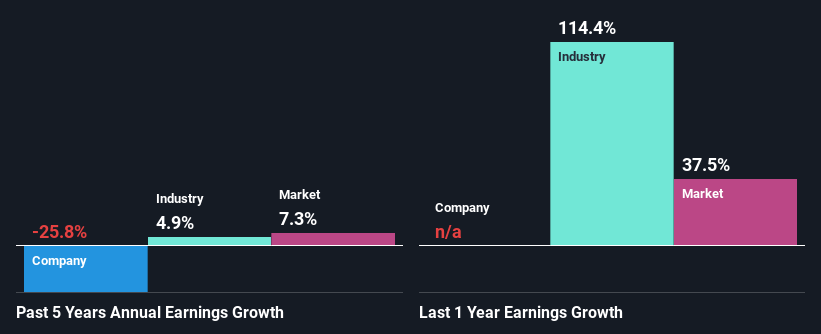Great Portland Estates Plc's (LON:GPOR) Dismal Stock Performance Reflects Weak Fundamentals
It is hard to get excited after looking at Great Portland Estates' (LON:GPOR) recent performance, when its stock has declined 3.6% over the past three months. Given that stock prices are usually driven by a company’s fundamentals over the long term, which in this case look pretty weak, we decided to study the company's key financial indicators. Particularly, we will be paying attention to Great Portland Estates' ROE today.
ROE or return on equity is a useful tool to assess how effectively a company can generate returns on the investment it received from its shareholders. Simply put, it is used to assess the profitability of a company in relation to its equity capital.
See our latest analysis for Great Portland Estates
How To Calculate Return On Equity?
The formula for return on equity is:
Return on Equity = Net Profit (from continuing operations) ÷ Shareholders' Equity
So, based on the above formula, the ROE for Great Portland Estates is:
0.7% = UK£15m ÷ UK£2.0b (Based on the trailing twelve months to September 2021).
The 'return' is the profit over the last twelve months. So, this means that for every £1 of its shareholder's investments, the company generates a profit of £0.01.
Why Is ROE Important For Earnings Growth?
We have already established that ROE serves as an efficient profit-generating gauge for a company's future earnings. We now need to evaluate how much profit the company reinvests or "retains" for future growth which then gives us an idea about the growth potential of the company. Assuming everything else remains unchanged, the higher the ROE and profit retention, the higher the growth rate of a company compared to companies that don't necessarily bear these characteristics.
A Side By Side comparison of Great Portland Estates' Earnings Growth And 0.7% ROE
As you can see, Great Portland Estates' ROE looks pretty weak. Not just that, even compared to the industry average of 8.4%, the company's ROE is entirely unremarkable. For this reason, Great Portland Estates' five year net income decline of 26% is not surprising given its lower ROE. We reckon that there could also be other factors at play here. For instance, the company has a very high payout ratio, or is faced with competitive pressures.
That being said, we compared Great Portland Estates' performance with the industry and were concerned when we found that while the company has shrunk its earnings, the industry has grown its earnings at a rate of 4.9% in the same period.
The basis for attaching value to a company is, to a great extent, tied to its earnings growth. What investors need to determine next is if the expected earnings growth, or the lack of it, is already built into the share price. This then helps them determine if the stock is placed for a bright or bleak future. If you're wondering about Great Portland Estates''s valuation, check out this gauge of its price-to-earnings ratio, as compared to its industry.
Is Great Portland Estates Using Its Retained Earnings Effectively?
With a three-year median payout ratio as high as 118%,Great Portland Estates' shrinking earnings don't come as a surprise as the company is paying a dividend which is beyond its means. Paying a dividend beyond their means is usually not viable over the long term. Our risks dashboard should have the 2 risks we have identified for Great Portland Estates.
Moreover, Great Portland Estates has been paying dividends for at least ten years or more suggesting that management must have perceived that the shareholders prefer dividends over earnings growth. Our latest analyst data shows that the future payout ratio of the company is expected to drop to 65% over the next three years. The fact that the company's ROE is expected to rise to 2.6% over the same period is explained by the drop in the payout ratio.
Conclusion
In total, we would have a hard think before deciding on any investment action concerning Great Portland Estates. The low ROE, combined with the fact that the company is paying out almost if not all, of its profits as dividends, has resulted in the lack or absence of growth in its earnings. Having said that, looking at current analyst estimates, we found that the company's earnings growth rate is expected to see a huge improvement. To know more about the latest analysts predictions for the company, check out this visualization of analyst forecasts for the company.
This article by Simply Wall St is general in nature. We provide commentary based on historical data and analyst forecasts only using an unbiased methodology and our articles are not intended to be financial advice. It does not constitute a recommendation to buy or sell any stock, and does not take account of your objectives, or your financial situation. We aim to bring you long-term focused analysis driven by fundamental data. Note that our analysis may not factor in the latest price-sensitive company announcements or qualitative material. Simply Wall St has no position in any stocks mentioned.
Have feedback on this article? Concerned about the content? Get in touch with us directly. Alternatively, email editorial-team (at) simplywallst.com.

 Yahoo Finance
Yahoo Finance 
